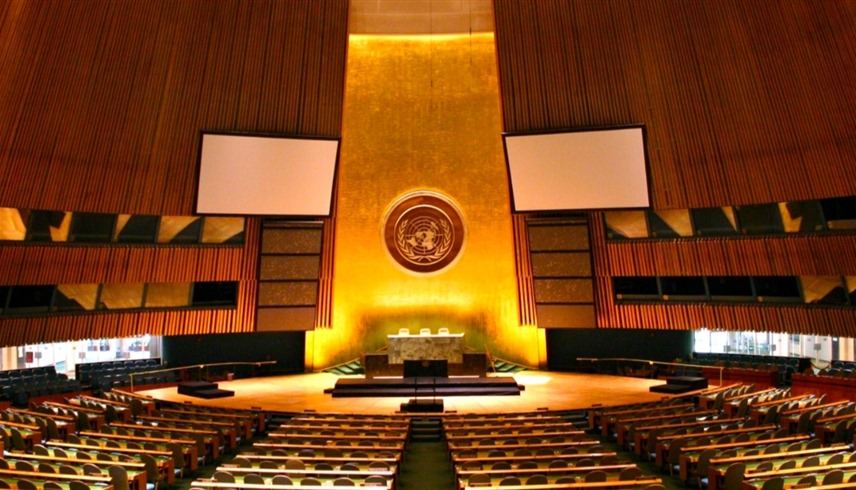UN Resolution on Israeli Occupation Sparks Debate
The UN General Assembly adopts a resolution calling for an end to the Israeli occupation within 12 months, stirring international controversy.
Published September 19, 2024 - 00:09am

Image recovered from 24.ae
The United Nations General Assembly has adopted a resolution demanding that Israel end its occupation of Palestinian territories within 12 months. This landmark resolution, introduced by the State of Palestine, involves complex geopolitical dynamics and has prompted significant international debate.
The resolution, which is based on an advisory opinion issued by the International Court of Justice (ICJ) in July, declares the Israeli occupation of Palestinian territories since 1967 as illegal. The ICJ called on Israel to terminate its presence in these areas as soon as possible, a sentiment echoed vehemently in the UN resolution.
The Palestinian representative to the United Nations, Riyad Mansour, emphasized the fervor behind the resolution, stating that its aim is to leverage international pressure through the General Assembly and the historic ICJ decision to compel Israel to alter its stance. The resolution's language was deemed more concrete than previous texts, leading to heightened responses from various nations.
Support for the resolution was substantial, with 124 votes in favor, although there were 14 objections, including from Israel, the United States, Hungary, the Czech Republic, and others. Additionally, 43 member states abstained from the vote. This development follows a series of previous non-binding resolutions and stands as the first major initiative by the State of Palestine since acquiring enhanced observer status at the UN.
The resolution demands that Israel withdraw its forces from Palestinian territories, cease further settlement construction, restore confiscated lands and properties, and permit the return of displaced Palestinians. A significant aspect abandoned during negotiations was a clause urging member states to halt arms exports to Israel, which indicates the intricate balancing of international relations and interests involved in the decision.
Israel, reacting firmly, condemned the resolution. Israeli UN Ambassador Danny Danon criticized the decision, describing it as a reward for terrorism and a misguided diplomatic move. The Israeli Foreign Ministry described the General Assembly as a biased political platform disconnected from reality, which allegedly promotes terrorism and undermines peace efforts.
In the broader context of the Israeli-Palestinian conflict, the resolution has gained symbolic importance. It represents the international community's ongoing concern over the legal and humanitarian implications of the prolonged occupation. The resolution's adoption coincides with new tensions in the region, particularly the escalating violence in Gaza between Israeli forces and Hamas, which has resulted in significant casualties on both sides.
The resolution also calls on UN member states to enact measures to halt the transfer of arms and ammunition to Israel if there are reasonable grounds to believe they may be used in occupied territories. This includes potential sanctions on individuals aiding the continued illegal presence of Israel in these regions. These proposals aim to exert economic and diplomatic pressure to foster compliance with international law.
The US, a longstanding ally of Israel, voiced strong objections. US Ambassador Linda Thomas-Greenfield labeled the resolution as biased, criticizing its failure to address Hamas' control over Gaza and asserting that it does not contribute towards a viable two-state solution. The US consistently opposes unilateral measures it perceives to compromise prospects for peace negotiations.
The ramifications of the resolution extend to global diplomacy and international relations. The Palestinian Authority praised the move, seeing it as a crucial step towards gaining full UN membership and increased international recognition. Conversely, Israeli officials perceive it as an act of diplomatic warfare, potentially exacerbating tensions in an already volatile region.
As world leaders prepare to gather for the annual General Assembly session, this resolution is expected to remain at the forefront of discussions. Israeli Prime Minister Benjamin Netanyahu and Palestinian President Mahmoud Abbas will both address the assembly, presenting their positions on the matter. This face-off underscores the deep-rooted and complex nature of the Israeli-Palestinian conflict, with significant global implications.
The adoption of the resolution marks a pivotal moment in the Israeli-Palestinian conflict, reflecting international discontent with the status quo and illustrating the challenges of achieving a peaceful resolution. While the resolution by itself is non-binding and largely symbolic, it holds considerable political weight and underscores the urgency with which the international community views the occupation.





